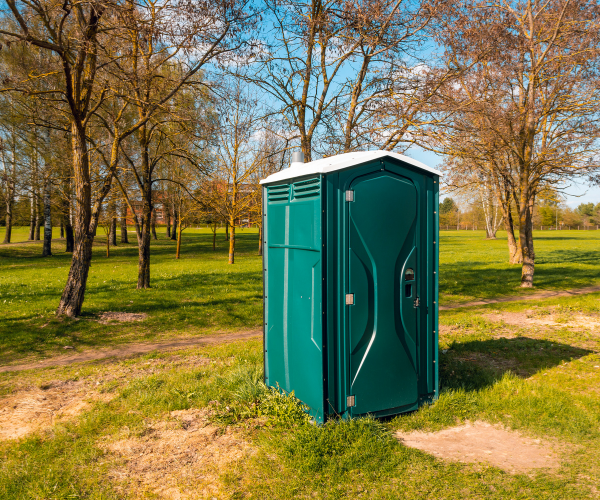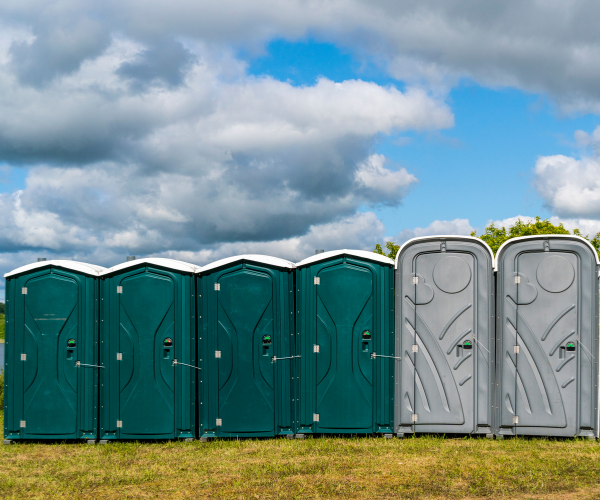Portable toilets offer numerous eco-friendly benefits that make them a sustainable option for sanitation needs. By using less water compared to traditional flush toilets, they significantly reduce water consumption, a vital consideration in areas prone to drought and water shortages. Additionally, the waste from portable toilets is typically collected and treated at wastewater facilities, reducing the potential for environmental contamination that can occur with poorly managed septic systems. Further adding to their green credentials, many portable toilet companies now offer units made from recycled or sustainable materials, and some products even incorporate solar-powered ventilation, reducing reliance on non-renewable energy sources. The mobile nature of portable toilets means they can be flexibly deployed, minimizing the need to construct permanent facilities that may not be required year-round. Moreover, portable toilets can play a key role in large-scale events and construction projects by consolidating human waste management into single, controlled locations. This centralization reduces the environmental footprint and aids in more efficient waste separation and recycling processes. With options for biodegradable deodorizers and cleaning agents, the green potential of portable toilets is continually expanding, resonating with eco-conscious consumers and businesses alike.

Portable Toilet Rentals in Hendry County, Florida
Call today for a free quote (239) 448-4385
Portable Toilet
Fast, Easy, & 100% Free To Get Started
Years of Trusted Experience
For over 20 years, our Portable Toilet company in Hendry County has built lasting relationships with the community and consistently delivered top-notch services. We prioritize customer satisfaction in every service we offer.
Unwavering Quality Service
We commit to delivering portable toilet solutions with the highest quality standards, ensuring cleanliness and reliability for every rental. Trust us to provide services that meet and exceed expectations.
Swift, On-Time Delivery
Our fast, reliable delivery service ensures your portable toilet needs are met precisely when needed. We prioritize promptness and efficiency to support your event's seamless execution.
Reliable Portable Toilet Services in Hendry County
Call for a Free Quote Today
(239) 448-4385
At our Portable Toilet company in Hendry County, we pride ourselves on being dependable, reliable, and locally owned. Our services extend to nearby areas, providing convenient and clean solutions for construction sites, parties, festivals, and weddings. Our reputation for reliability is built on our commitment to delivering well-maintained portable toilets that meet the needs of any occasion. Being locally owned, we understand the community's unique requirements and are dedicated to maintaining high standards of sanitation. Whether you are hosting a large public event or need facilities for a construction project, you can count on us to exceed your expectations. We strive to ensure that our services enhance the comfort and convenience of your guests or workers, making every event a success.


Our standard porta john rental units are durable and reliable for any commercial build site, housing development, public works project, or remodel job.Features include dome lighting, grated floors, and an “In-Use” locking mechanism for privacy and comfort. Regularly maintained, inspected, and cleaned by FusionSite at your location.

Developed as an alternative to full ADA-compliant restrooms, the Liberty is a spacious, wheelchair-accessible unit that can also be promoted as a family-sized restroom. Includes a patented flat-floor system for easy wheelchair access and maneuverability.Handrails, paper holder, and rotary latch are designed for simple, intuitive end-user operation.

Portable hand washing stations are essential for keeping your work site sanitary and clean. Features hands-free foot pumps, liquid soap, and paper towels.Perfect for job sites without water hookups, these units can handle hundreds of washes between services.
We Proudly Serve
Standard Portable Toilets
Standard portable toilets offer reliable sanitation solutions for various outdoor events and construction sites in Florida.
High Rise Portable Toilets
High Rise Portable Toilets provide essential mobile restroom facilities for high elevation construction sites in Hendry County.
Restroom Trailers
Restroom trailers offer luxury restroom amenities for events in Hendry County with Premier Portables' quality service.
Roll off Dumpsters
Roll off dumpsters provide efficient waste management solutions for construction and event settings in Hendry County.
Septic Tank Cleaning
Septic tank cleaning ensures sanitary conditions and continuous operation of waste systems in Florida with Premier Portables.
Grease Trap Cleaning
Grease trap cleaning maintains health and efficiency in commercial kitchens throughout Hendry County in Florida.
Fencing & Barricades
Fencing & Barricades offer indispensable perimeter solutions for crowd control in Florida by Premier Portables.
Residential Storage
Residential storage solutions provide secure, temporary storage for households in Hendry County, Florida.
Hendry County Portable Toilet and Sanitation Solutions
Obtaining a quote and scheduling delivery for a portable toilet with us is both simple and convenient. Start by using the forms located at the top and bottom of our webpage, or simply click any of the 'Get A Quote' buttons throughout the site. Our forms require minimal information: your first name, last name, phone number, and email address. This straightforward process ensures you can quickly and easily receive a personalized quote tailored to your needs. Whether you are planning a large event or require facilities for a construction site, our seamless online system makes it easy to arrange the necessary sanitation solutions. Once your quote is requested, our team promptly evaluates your needs and returns with a competitive offer. We are committed to providing transparent, cost-effective pricing and exceptional customer care. Our efficient system ensures that once your quote is approved, we move quickly to schedule delivery at a time and location convenient for you. This dedication to service means you can focus on your event or project knowing the sanitation logistics are well-handled. In Hendry County and beyond, rely on us for a hassle-free portable toilet rental experience from quote to delivery.

Our portable toilet services in Hendry County blend local charm with practicality. With the renowned Swamp Cabbage Festival in nearby LaBelle and the scenic allure of Lake Okeechobee, our solutions ensure your guests have access to clean and reliable restroom facilities. At local festivals, family gatherings, or nature-centric events, we enhance the guest experience with our top-notch services. With numerous benefits of choosing us, your event can run smoothly amid the beautiful landscapes of Hendry County. Our dedication to convenience and reliability ensures our portable toilets are the best choice for any occasion.
We lead as Hendry County's foremost provider of Portable Toilets, deeply rooted in the community. Our local knowledge and dedication to quality position us as the premier choice for Portable Toilet services. By choosing us, you benefit from reliable and spotless sanitation solutions, precisely tailored to meet the varied demands of Hendry County's unique environments.
Our company offers unparalleled portable toilet services in Hendry County, delivering swiftly and reliably. Recognizing the urgency of timely sanitation for both events and work sites, we ensure precise delivery schedules. With our dedicated team's commitment, we have become the trusted provider for portable toilet rentals. Rely on us for prompt service and maintenance, ensuring your event proceeds smoothly.
Learn More About Our Portable Toilet in Hendry County
To rent a portable toilet in Hendry County, you can start by visiting our website where we offer various options to get a personalized quote. The process is designed to be user-friendly and accessible: simply locate and fill out the forms positioned at the top and bottom of the webpage, or leverage the 'Get A Quote' buttons scattered throughout the pages. The form will ask for straightforward details such as your first name, last name, phone number, and email, ensuring we have all the necessary contact information to assist you efficiently. Once submitted, these forms are promptly reviewed by our customer service team who are dedicated to providing fast, courteous service. In the quote request, you have the chance to specify the number and type of portable toilets needed, as well as the event or project details, allowing us to tailor our service offering precisely to your requirements. After receiving your request, we quickly prepare a competitive quote that reflects the best value for your needs. Our procedures are streamlined to enable swift responses, so you're not left waiting. Rest assured that once the quote is accepted, we will schedule delivery at a date and time convenient for you, ensuring the seamless arrival and setup of your portable toilets. Renting from us means embracing an efficient, hassle-free experience that keeps your focus on the event or project at hand.
Our efficient delivery system is designed to accommodate the pressing needs of our clients, ensuring that portable toilets arrive on-site when you need them. Typically, orders are processed swiftly, often within 24 to 48 hours, depending on the demand and specific requirements given by our customers. During peak event seasons, we advise placing orders in advance to secure your portable toilets in the desired time frame, aligning with your event's schedule or construction deadlines. Our commitment to punctuality means that once a delivery date is confirmed, you can expect timely arrival without last-minute surprises, allowing for smooth logistics on your site. Whether it's a single unit for a small gathering or multiple units for a large-scale event, our team ensures each order adheres to the promised schedule. In instances where immediate delivery is necessary, we also offer expedited services subject to availability and specific situations. You can trust us to communicate clearly and promptly, providing updates and confirmations every step of the way, guaranteeing peace of mind and assurance that your sanitary solutions will be in place for when they're needed most.
Yes, we are fully equipped to service any type of event or construction site, tailoring our offerings to meet a wide variety of needs. Our extensive range of products includes luxury restroom trailers, standard porta potties, roll off dumpsters, fencing, barricades, holding tanks, ADA-compliant units, portable sinks, and hand sanitizer stations. Whether you're hosting a festival, managing a sporting event, or preparing a wedding, corporate gathering, or family reunion, we have the ideal sanitation solutions for the occasion. Our services are adaptable and scalable, designed to maintain cleanliness and convenience regardless of site conditions or attendee volume. We pride ourselves on delivering exceptional amenities that enhance guest experiences and provide peace of mind to event coordinators. On construction sites, our products boost productivity by ensuring sanitary conditions for workers, fulfilling safety regulations, and maintaining a hygienic work environment. Our commitment to customer satisfaction drives us to continuously evaluate and innovatively expand our service offerings, ensuring we remain at the forefront of the portable sanitation industry. Rest assured, our team of experts works closely with you, providing guidance and support from planning through execution, ensuring every logistic detail is meticulously attended to, so your event or project runs smoothly.

